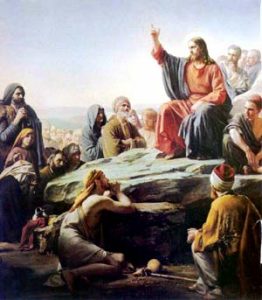This quarter our goal is to see what it means to be a disciple of Jesus. The twelve chosen during His earthly ministry were the beginning of a church movement, and their example as revealed to us in the Gospels will shed much light on how discipleship works.
The passion to follow Christ continues to fuel our behavior and attitude changes, but also encourages us to share the love and wisdom we glean from sitting at Jesus’ feet, as did the original twelve. It’s not just about knowing the Man; it’s about following Him and becoming more like Him each day of our lives.
Many new Christians began their Christian walk through a study of the Gospels. Therefore it’s easy to think we have mastered what it means to be a disciple. But if we think we have learned all there is to know on this topic, we are deceived and have only scratched the surface, because we never cease to need instruction from Jesus and His word. There is always more from His word that we need to address and apply to our lives.
This week we study the Bible’s part in making discipleship work. How did Jesus use the Scriptures in His discipling and soul-winning efforts? Our first indication of its value is seen in our memory text:
Memory Text: “Search the scriptures; for in them ye think ye have eternal life: and they are they which testify of me.” John 5:39 KJV
Two things we can find in this verse:
- Jesus expects us to diligently study the Bible
- The whole point of the Bible is to point us to Christ, our Savior
Sunday: Jesus and the Bible
The story in Luke, chapter 2, of young Jesus holding the religious leaders spellbound in the temple when His family was visiting Jerusalem for the Passover, indicates to us that He was well-versed in the Hebrew Scriptures from an early age.
By the time He began His public ministry, He was solid enough in the written word that He was able to contend with Satan himself during His 40-day stay in the wilderness. In fact, many portions, no doubt, had been committed to memory.
When He visited the synagogue in Nazareth, shortly after this wilderness experience, He infuriated the worshipers there by pointing out that verses in Isaiah were fulfilled in Him. This incident shows us that Jesus was ready and willing to use the Scriptures to point out His mission as the Messiah.
From these examples of Jesus’ use of the Bible, we can see that its use can extend to:
- explaining the salvation gospel to those who are truly interested
- helping us overcome Satan’s temptations
- witnessing about Jesus to those who don’t know Him
Discussion Question: In what ways can we use the Bible in our church service and personal devotions that will match the uses Jesus made of the written word? In what ways do we sometimes misuse the Bible?
Monday: The Authority of Scripture
There were many ways that Jesus uplifted the Bible and indicated its authenticity:
- “Think not that I am come to destroy the law, or the prophets [the Old Testament] : I am not come to destroy, but to fulfill.” Matthew 5:17 KJV
- Jesus used the Bible to justify His actions on the Sabbath (Matthew 12:3-8)
- “But in vain they do worship me, teaching for doctrines…” He held them as a reliable code of conduct, as opposed to traditions of men (Matthew 15:3-11)
- “Sanctify them through thy truth: thy word is truth.” John 17:17 KJV
- “And he said unto them, These are the words which I spake unto you, while I was yet with you, that all things must be fulfilled, which were written in the law of Moses, and in the prophets, and in the psalms, concerning me.” Luke 24:44 KJV
From the above texts we can see that Jesus relied on the Scriptures in His dealings with people, and regarded them as valid and true sources of information, not as myths, as many have portrayed them.
He set us an example of:
- exalting
- honoring, and
- obeying the Bible.
Discussion Questions: Why should we not turn to abstract philosophies or charismatic personalities as our source of spiritual truth?
Have you ever found yourself disenchanted with a well-known preacher or evangelist?
What is the only thing that can prevent us from falling for false doctrines and teachers?
Tuesday: Public Proclamation
The well-known Sermon on the Mount was based largely on the Bible. He began by pointing out the values of His kingdom, addressing things that His listeners would try to avoid, such as mourning, meekness, and hungering after righteousness.
That got their attention, and then He expounded on the law, something they were very familiar with, but not in the light He shed on it. They must have been shocked to hear that thinking about breaking the law made you as guilty as if you had actually committed the act.
Jesus was attempting to break through three barriers in the minds of the Jews.
They had fallen into the practice of being:
- legalistic
- judgmental
- condemnatory
Discussion Questions: How does being legalistic lead to being judgmental and then condemnatory? It certainly worked that way in Jesus’ day, finally leading to His condemnation and death by the religious leaders.
How can we prevent ourselves from becoming legalistic and why is it so easy to find ourselves with that frame of mind?
Wednesday: Personal Ministry
Review the story of the disciples on the road to Emmaus (Luke 24:13-35). What a Bible study these discouraged followers must have had from the Savior Himself!
“And beginning at Moses and all the prophets, he expounded unto them in all the scriptures the things concerning himself.” Luke 24:27 KJV
It would have been easy for Jesus to astound them by revealing Himself to them in His glorious, resurrected form. But instead of using miracles, He gave us the example of how to effectively win people to Christ. And it worked…
“And they said one to another, Did not our heart burn within us, while he talked with us by the way, and while he opened to us the scriptures?” v. 32 KJV
Discussion Questions: What does it mean that their hearts burned within them? Contrast this response with the reaction of the worshipers in the Nazareth synagogue. (See Sunday.) Why were their responses so different?
Is it possible to know something about Jesus and God, but not as much as we need to know, like these disciples? What else can this spiritual condition lead to besides discouragement? [Suggestions: arrogance, apathy…]
When do you ever get to the place that you know enough about the Bible? Is it ever safe to stop reading and studying it? Why?
Thursday: The Next Generation
Nowhere in the Gospels do we find Jesus questioning even one Bible verse. Yet, today and in the past, Bible scholars have continued to deny its authority, authenticity, and its veracity.
Jesus’ use of the Scriptures is worthy of our notice, as we contemplate how to become disciples. From His need in overcoming Satan in the wilderness, to teaching His followers throughout His ministry about the nature of His kingdom, Jesus uplifted the value of the Bible.
The Bible truly impacts:
- how we live, and
- how we relate to others.
The truth of the matter is that these are the two important areas we need to explore when it comes to being a disciple: how we live and relate to others. So the Bible truly is going to be helpful in our search this quarter for just what it takes to be a firm disciple of Jesus.
Discussion Question: In what way is the Bible more than simply a book?
How can we honor it or treat it differently than an ordinary book? [Suggestions: never open its pages without having prayer for the Holy Spirit’s help in understanding what you read…don’t put other books or objects on top of your Bible?…]
Since we are usually drawn to those parts of Christ’s character that mirror our own needs and personalities (such as His justice, love, forgiveness, or power), how can the Bible help us have a more balanced view of Jesus’ character and ministry?
Summary: “Christ in His ministry had opened the minds of His disciples to these prophecies…Peter in preaching Christ had produced his evidence from the Old Testament. Stephen had pursued the same course. And Paul also in his ministry appealed to the scriptures foretelling the birth, sufferings, death, resurrection, and ascension of Christ. By the inspired testimony of Moses and the prophets he clearly proved the identity of Jesus of Nazareth with the Messiah and showed that from the days of Adam it was the voice of Christ which had been speaking through patriarchs and prophets.” Ellen G. White, The Acts of the Apostles, p. 221-222
Challenge: Give yourself more time for Bible study AND reflection this coming week!
Next Week: Discipling Through Metaphor












